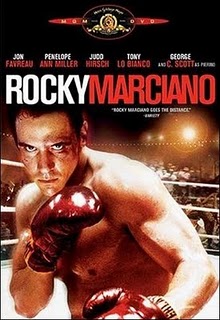Top Qs
Timeline
Chat
Perspective
Rocky Marciano (film)
1999 American TV film From Wikipedia, the free encyclopedia
Remove ads
Rocky Marciano is a 1999 television film directed by Charles Winkler and presented by MGM.[1] It tells the story of the rise to fame of legendary boxer Rocky Marciano, played by Jon Favreau. The film premiered on Showtime on May 15, 1999.
This article's plot summary needs to be improved. (October 2016) |
Remove ads
Plot
The film shows Rocco's childhood through his fight with his hero Joe Louis. After the Louis fight it flashes forward to his post career, leading up to his death in a 1969 plane crash. The film is noted for its "...blow-by-blow account of the Marciano-Louis fight,"[2] that is presented as a turning point in Marciano's career.[3]
Cast
- Jon Favreau as Rocky Marciano
- Penelope Ann Miller as Barbara Cousins
- Judd Hirsch as Al Weill
- Tony Lo Bianco as Frankie Carbo
- Duane Davis as Joe Louis
- Rino Romano as Allie Colombo
- George C. Scott as Pierino Marchegiano
- Rhoda Gemignani as Pasquelina Marchegiano
- Aron Tager as Charley Goldman
- Noah Danby as Carmine Vingo
Production
The story is based on a memoir by William Nack.[4]
In an interview given to Entertainment Weekly, Favreau explained that he had followed an intensive training to prepare himself for the role.[5] The director of the film, Charles Winkler, is the son of Irwin Winkler, producer of the Rocky franchise.[6][7]
Reception
Summarize
Perspective
The movie has received mostly mixed to bad reviews. Mick Martin and Marsha Porter, authors of A DVD & Video Guide - 2005, found the biopic "...perfectly portraying the spirit of the heavyweight. The events and characters are compelling and engaging..."[8]
A review in Variety, only praised some aspects of the film including the acting and cinematography:
"...the execution also works... Winkler utilizes the flashbacks sensibly, laying the groundwork for Marciano’s bizarre behavior after his career ended. And though he doesn’t always achieve the right emotional tone—a lot of potent scenes seem soft—his steady approach is commendable. Tech credits are topnotch, highlighted by Clayton Halsey’s precise editing and Paul Sarossy’s smooth lensing."[9]
—Michael Speier, Variety
A review in TV guide was less praiseworthy, stating, "Favreau lands this production’s sole knockout punch: He captures both the undefeated heavyweight champ's outward bravado and inner insecurity. Fight fans will cheer the restaging of famous bouts, but the unconvincing performances of much of the cast undermines the drama."[10] Richard Sandomir, writing for The New York Times, criticized extensively the film's lack of accuracy, judging it is a "docudrama that only occasionally lets truth stand in the way of the story.[11]
Remove ads
Awards and nominations
- Canadian Society of Cinematographers Awards
- 1999: Won, "Best Cinematography in TV Drama"[12]
- 2000: Nominated, "Best Sound Editing - Television Movies and Specials - Effects & Foley"
See also
References
External links
Wikiwand - on
Seamless Wikipedia browsing. On steroids.
Remove ads

